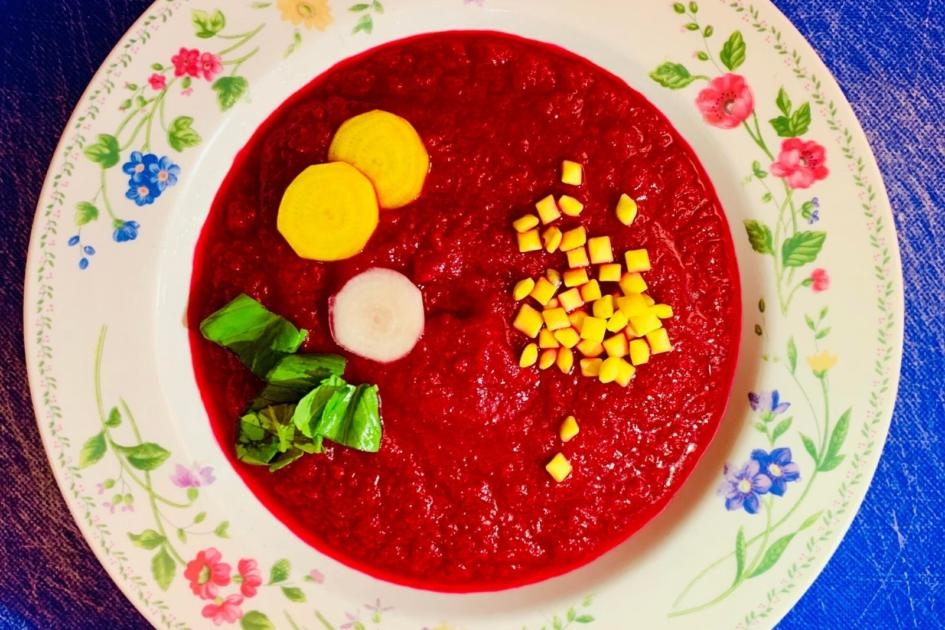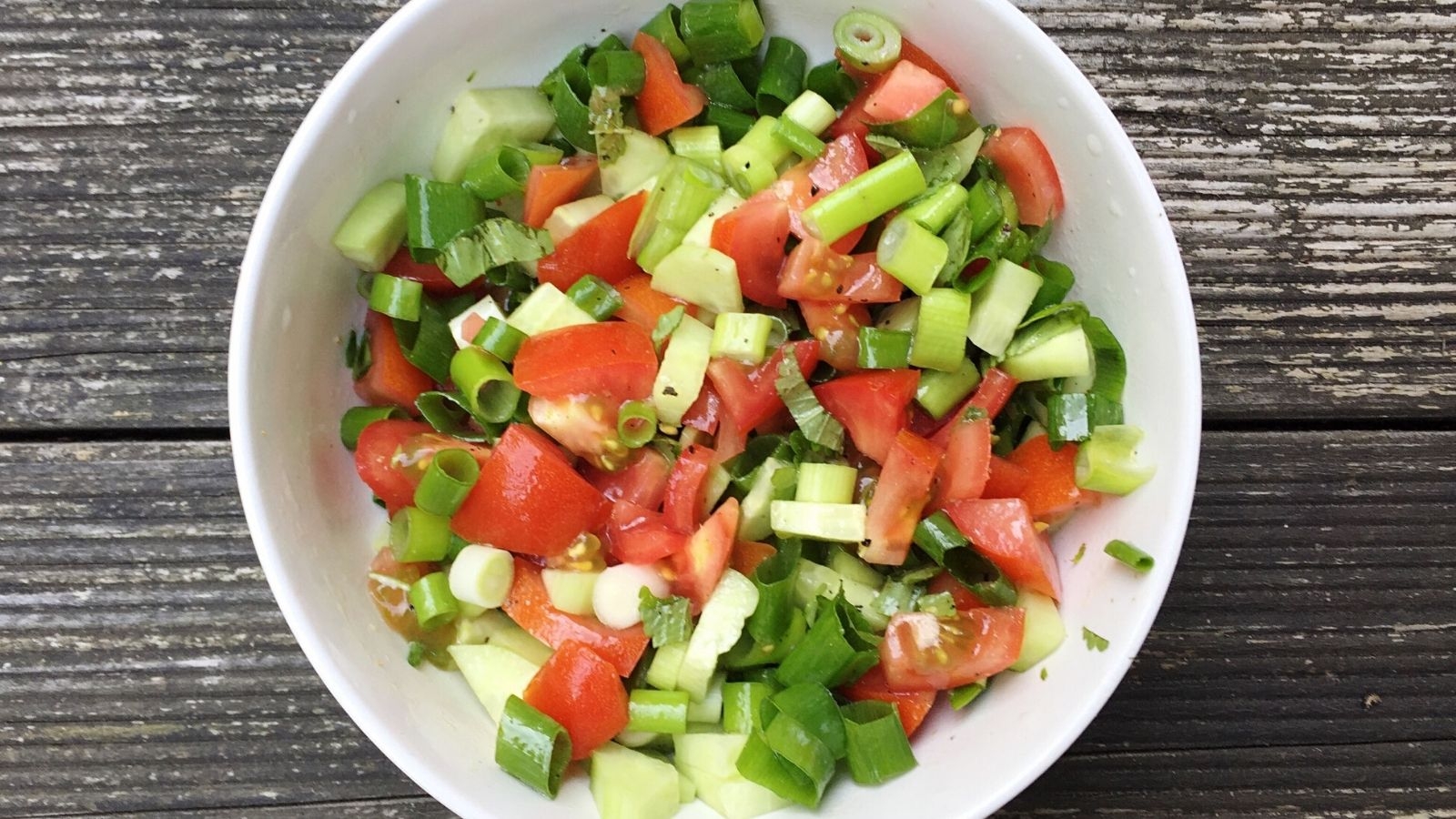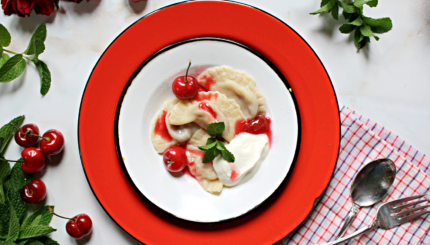I heard him speak years ago, and I was taken by his easy smile, tales of his lively family, love of Israeli cuisine, and how he wove those three pieces together into a fascinating presentation. When I found him on Instagram recently, I became a woman obsessed. Gil Hovav, author of 10 Israeli cookbooks, TV personality, restaurant critic, and overall smart, funny, and likable guy, presents food that I aspire to make: colorful, delicious, creative yet achievable.
How does he do it?
“Here’s what’s important when you address the kitchen,” says Hovav. “Be modest. As we say in Hebrew: ‘Don’t jump higher than your belly button.’ Don’t be pretentious.” Or in other words, keep it simple.

The Nosher celebrates the traditions and recipes that have brought Jews together for centuries. Donate today to keep The Nosher's stories and recipes accessible to all.
Hovav has enormous respect for the previous generations of home cooks who worked often with limited budgets, limited ingredients, and limited space.
“I want to preserve the recipes that came before me. I don’t want to change them. I don’t want to improve them,” he says.
A rule for simple cooking? “Some dishes take a lot of time. In many cases, a low flame is better than a high one. Try to avoid shortcuts. If a soup needs half a day on a low flame, give it half a day. Give it a night in the fridge, if the next day it will taste better. Have patience. Have respect for simple ingredients.”
That rule applies to all sorts of dishes. When Hovav makes a chopped salad, he makes it very rough. “A tomato cut in four. Lots of olive oil. Lots of lemon. Kosher salt. Coarsely ground black pepper. Sometimes herbs or carrots or scallions or kohlrabi. But”, he says, “you should let the vegetable speak and keep its dignity. Who says the chef is more important than the tomato?”
He cooks with what he finds – in the markets, and even on neighboring trees. Recently, his daughter’s mother presented him with a pile of deep purple mulberries. It was the season. Day after day, his Instagram was filled with: fruit salad made of mulberries, purple ice cream, mulberry jam. No sooner was each dish made, he said, than it was devoured. And then look what I learned! The leaves of the mulberry tree, the very same tree that silkworms love to eat, are edible and stuffable, like grape leaves. He did that, too.
Why, according to Hovav, has Israeli food become so popular? Because, he says, it’s so colorful. The food comes from the markets that explode with reds, oranges, greens, purples — colors that pop. “Brown food,” says Hovav, “is the best food. But, unfortunately, these are not the times for brown food. It went out of fashion because it’s difficult to shoot.”
Simple food is beautiful, says Hovav. “Simple can be enticing and the whole process of cooking should be fun. Make a mess of your kitchen. Eating should be fun. Don’t be afraid of your food.”
He created this recipe for purple gazpacho, and it touches all the points. It’s made from the beautiful produce in the market, it’s simple to make, it’s perfect for the upcoming hot season and it pops on Instagram – just like so much of the modern Israeli cuisine we have grown to expect and admire. And if you are looking for something old school, homey, simple and delicious, and a touch brown, Hovav suggests pashtida which is a cross between an omelette and a quiche in which you can make use of all the bits of cheese and vegetables hanging around your fridge. Try our recipe for zucchini, corn and tomato pashtida.

Ingredients
For the soup:
- 1 large red onion, peeled and cut into eighths
- 4 garlic cloves, peeled
- 2 red peppers, deseeded and roughly chopped
- 4 large ripe tomatoes, cut into eighths
- 4 beets, peeled and cooked (also possible to buy cooked beets sold in vacuum packs)
- 1 28 oz can (800 grams) crushed tomatoes
- 5 cups tomato juice
- 5 Tbsp olive oil
- Salt & freshly ground black pepper
For serving:
- Fresh chopped herbs (coriander, parsley, dill)
- Scallions, finely chopped
- Croutons
- Hard-boiled eggs, quartered
- Balsamic vinegar
Directions
- Place the first 5 ingredients on the list (onion, garlic, peppers, tomatoes and beets) in a food processor with the steel blade and process well to produce a homogenous paste (it takes about 5 minutes, which seems like an eternity).
- Add the crushed tomatoes, tomato juice, olive oil, salt and pepper. Mix well, taste, and adjust seasoning. If the food processor's bowl is not big enough, you can add just a portion of the tomato juice and add the rest later.
- Transfer mixture into a large bowl (any remaining tomato juice is to be added at this stage), cover with plastic wrap and keep in the refrigerator.
- When serving, place 3 ice cubes in each bowl, pour the cold soup over the ice cubes and add a tablespoon of the fresh chopped herbs, tablespoon of croutons, tablespoon of chopped scallions, 2-3 quarters of an egg and a splash of balsamic vinegar. Do not stir – the diners stir the soup themselves.



